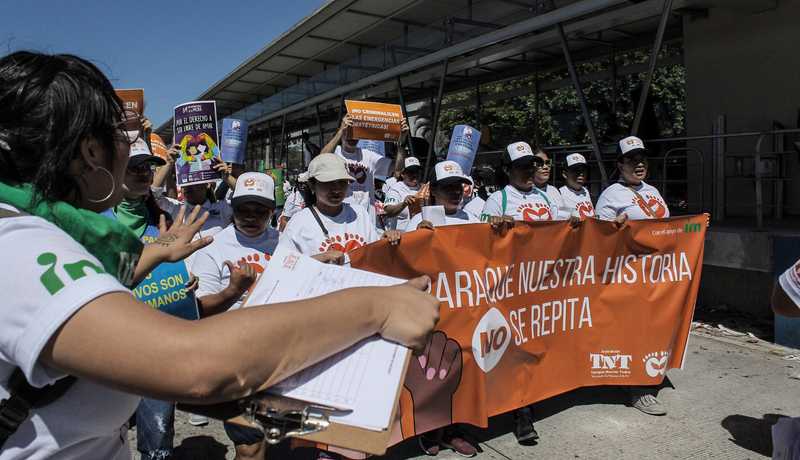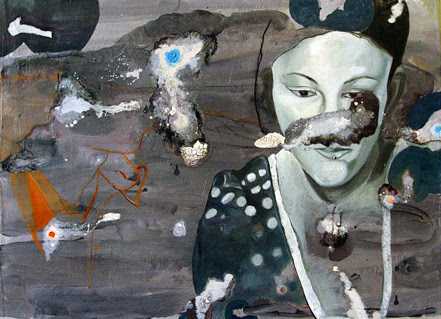
Teodora Vásquez spent ten years and seven months behind bars after suffering an obstetric emergency in 2007. She was 22, and nine months pregnant, when she suddenly felt labour pains while working as cleaner in a school. She only had time to call an ambulance before she collapsed. When she woke up, the baby was dead and the doctors had denounced her. She was sentenced to 30 years for murder.
El Salvador has some of the world’s harshest anti-abortion laws. Not only is abortion prohibited in all circumstances, including in cases of rape, incest or when the life of the pregnant person is at risk, it is also severely punished – with up to eight years in prison.
But women who suffer an obstetric complication, such as a miscarriage or stillbirth, are punished even more harshly: they can be prosecuted for murder or aggravated murder and face up to 50 years inside. Hundreds of women, most of them poor, have been sentenced to long prison terms.
While in jail, Vásquez decided she must do something to help other women avoid the same fate. In Ilopango women’s prison, located a few miles outside the capital, San Salvador, she met Ena Munguía Alvarado, also imprisoned for an obstetric emergency.
“I decided that we had to speak out and defend ourselves. I began to learn and started reading and writing everything down. That’s when my fight began,” Vásquez recalls.
“The only choice was to unite, to make noise from inside the prison, so that legal and social mobilisation could begin to get the imprisoned women out. At that time, there were 17 of us [in the same situation],” she adds.
Alvarado, who now works in a school kitchen, spent nine years in prison for attempted murder after giving birth prematurely to her son in the communal toilets of her rural village in 2009. Ervin Alexander, her fifth child, survived. While she was recovering in hospital, “the doctors told me that I was not going to leave,” says Alvardo. “Even though my son was alive, I spent more than nine years in prison. And I didn't get to see him until he was three years old.”
Between 2000 and 2019, 181 women were prosecuted for obstetric emergencies. "As long as there is no change in the country's laws, our history will repeat itself,” Vásquez says.
Women fighting for justice
On regaining their freedom, she and Alvarado founded the non-profit organisation Mujeres Libres El Salvador. The group provides training and support for women who, like them, have been deprived of their liberty, to enable them to reintegrate into society. The training is focused on personal growth, and covers legal issues, human rights, gender, and sexual and reproductive health.
For Vásquez, activism is her daily work. When she or her colleagues hear (via social media or word of mouth) that a woman has been imprisoned for an obstetric emergency, they get to work. They meet her in prison and work with lawyers who offer free legal support and representation.
Zuleyma Beltrán and Katy Araujo are also members of Mujeres Libres.
Beltrán, 42, gave birth when seven months pregnant in 1999 but the baby did not survive. "I had severe pain in my stomach and woke up in the hospital. My brother had called the ambulance, but neither he nor I knew about this law. I certainly didn't think I would end up in prison,” she says. Sentenced to 26 years, she served ten and a half. She now works in a coffee shop and spends her free time volunteering with Mujeres Libres.
Araujo, 37, was nine months pregnant when she had a stillbirth without medical assistance in 2013. She was 28 at the time, studying accounting at university and a single mother of a three-year-old daughter. She was sentenced to 30 years in prison. Today, thanks to the support of the group, Araujo has resumed her university studies in accounting.
The four women not only work together in Mujeres Libres, they now live together. In Casa Encuentro, a rented house and shelter in San Salvador, paid for by donations to the group. It has space for up to 12 women who are out of prison but have no help from their families or the state; they are given a roof over their heads, food, safety and support from Mujeres Libres.
Other women with similar experiences who travel to the capital to deal with legal issues or to try to rebuild their lives also drop in. “The most defining moment of this struggle is, after seeing a photograph of a woman in prison, I then see them free,” Vásquez says.
Mujeres Libres are trying several ways to get their stories known. There’s a radio show, ‘Entre Muros’ (broadcast online every third Tuesday of the month on Swiss station Radio LoRa); ‘Fly So Far’ (‘Nuestra Libertad’), a 2021 documentary film about Vásquez’s experience from prison to activism; and a play created by Tiempos Nuevos Teatro, which runs arts workshops for ex-prisoners.
"The idea is to reach adolescents who live in remote villages and, not knowing this law or having any sex education, could be potential victims of these injustices," Vásquez says.
Poverty and discrimination
The women have hard memories of their years in prison.
“I was discriminated against because of my ‘crime’,” says Araujo, who spent eight and a half years in San Miguel prison in the east of the country. “When I arrived, everyone knew why I was there and treated me badly – the police had turned everyone against me. The other inmates called me ‘baby killer’.
Key factors are social stigma towards women and high rates of gender-based and domestic violence, with more than three reported cases every day. "Those criminalised for obstetric emergencies are confronted with Salvadoran society, which is very patriarchal, conservative and classist,” Salvadoran philosopher and feminist activist Morena Herrera says.
“These are women who live in poverty, and this implies discrimination: it is thought that they don't want their children because they can't support them,” says Herrera, who chairs the Citizens' Group for the Decriminalisation of Abortion (Agrupación Ciudadana por la Despenalización del Aborto). “But the stigma is wider. They are deemed to have rebelled against the mandate of motherhood because in El Salvador, as in many societies, being a woman is identified with being a mother.”
Criminalisation operates at different levels: women are reported by doctors and nurses, but also by police and judges.
"In many cases, the idea that the women are guilty prevails, even when there’s no clear evidence, and so they are prosecuted and condemned,” Herrera says.
Legal battles
Other groups are also fighting for justice for women in El Salvador. With support from the Centre for Reproductive Rights (CRR – a global human rights group of lawyers), and a coalition led by Herrera’s Agrupación Ciudadana, 69 women have been set free since 2009. Different legal strategies have been used.
"Many lack adequate defence," explains Alejandra Coll, CRR advocacy advisor. "Our main goal is to change the law, but we also aim for women who have been unjustly criminalised to be released from prison as innocent. Not having a criminal record helps them to find work or housing.”
Agrupación Ciudadana works in three areas, according to the group’s coordinator Sara García: “women's freedom, changing social attitudes towards abortion, and the fight to change the law.” They also cooperate with the CRR and other human rights and legal organisations to bring cases to the Americas’ regional justice system.
On 23 March this year, these efforts bore fruit. The Inter-American Court of Human Rights held the first hearing in the case known as Beatriz vs. El Salvador, thus addressing for the first time the total ban on abortion in the Americas.
Beatriz (not her real name), a young woman from an impoverished rural family in El Salvador, was diagnosed with lupus when she gave birth to a premature baby in 2012 after a high-risk pregnancy. The following year, she became pregnant again and doctors told her that because of her illness and because the foetus had a malformation incompatible with life, she should not continue the pregnancy.
She pleaded for an abortion, which was denied. Only after widespread protests and a complaint to the Inter-American justice system did the state agree to a caesarean section, by which time her pregnancy was very advanced. The baby died hours after being born, and Beatriz, very weakened, lost her life four years later.
The Inter-American Court's binding ruling, expected in the autumn, may have repercussions for El Salvador and the region as a whole.
But it would not be the first condemnation by the Inter-American Court of the criminalisation of obstetric emergencies in El Salvador.
In the Manuela case in November 2021, the court condemned the Salvadoran state and ordered that it ensure patients’ fundamental right to confidentiality and professional secrecy is respected. Manuela (not her real name), a poor and illiterate rural woman, was sentenced to 30 years in prison after losing her pregnancy in 2008; she was imprisoned in inhumane conditions and without medical care for a chronic illness, which led to her death.
The Inter-American Court declared El Salvador “internationally responsible” for violating Manuela's rights to life, personal integrity, privacy, health, personal liberty, judicial guarantees and equality before the law. It also ordered the country to compensate Manuela's two orphaned children and to reform health protocols to prevent further criminalisation of poor women who suffer obstetric emergencies.
Currently, there are at least two women in prison and two others facing trial in conditions similar to those endured by Manuela.
Teodora Vásquez and her comrades remain determined, she says: “We want to work to overcome the trauma of prison, and make sure that no one else goes to prison after suffering obstetric emergencies.”
Alice is an Italian journalist with a degree in Political Science and International Studies from the University of Pisa. She travels to write and document the battles of oppressed populations demanding autonomy or self-determination and environmental and feminist protest movements. She is the editor of the project 'Atlante delle guerre e dei conflitti del mondo' (Atlas of world wars and conflicts) and the website Atlanteguerre.it.
Monica is an Italian freelance multimedia reporter specialised in environment and social justice, indigenous peoples, women's rights, food security and agroecology. She has reported from Honduras, Guatemala, India, Ecuador, Honduras, Brazil, Kyrgyzstan, Cambodia and Palestine. In 2017 she was a fellow of the International Women's Media Foundation. She holds a master's degree in Journalism from the University of Barcelona and Columbia University.
Photo: Mujeres Libres El Salvador / Facebook



